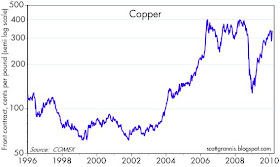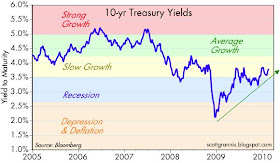More and more it becomes clear that the big collapse in 2008 was an aberration that resulted primarily from a severe shock to confidence and a huge and sudden increase in the world's demand for safety and liquidity, all triggered by fears of a collapse of the global financial system. Central banks were slow to respond to the unprecedented increase in the world's demand for money, and this resulted in a widespread selloff of all risk assets and massive deleveraging. Central banks eventually figured things out, and the return of liquidity has allowed prices of risk assets to recoup most of their losses. The collapse in monetary velocity which precipitated the recession has begun to reverse, and most economies around the world are again growing. The recovery is still in its early stages, however, and so there appears to be lots more room to the upside.
There have actually been two dramas playing out over the past year or so. One was the mechanical one that resulted from the shock to confidence and the huge increase in the demand for liquidity and safety. The other was the shock to long-term expectations that resulted from Obama's radical pursuit of a hard-left agenda that left investors struggling to comprehend the ramifications of a massive increase in government control over the economy and one new spending program after another. The expected burden of taxes began to soar; the anticipated efficiency and potential growth rate of the economy began to plunge; and the future solvency of the US government began to dissolve. The worst part of both dramas combined in a Perfect Storm to produce the equity market collapse of early March 2009.
Since then the economy has managed to heal many of its wounds, and the political scene has changed dramatically. We are now eight months into a recovery, and Obama's two signature initiatives, cap and trade and healthcare reform, are in a shambles. The Democratic Party appears to be completely out of touch with the mood of the electorate, which was never prepared for a hard turn to the left. The balance of power in Washington has shifted dramatically, and investor and consumer confidence is returning. (Whatever is bad for Washington is often good for individual liberty and free markets.)
One year ago we were asking ourselves how the economy could ever survive. Markets were braced for a future worse than the Depression, and years of global deflation were a virtual certainty. Stocks and corporate bonds were priced for Armageddon.
Today we are asking ourselves whether the economy will grow by 2% per year or by 4% per year. Whether the Republicans will regain control of Congress or not (with the best and most likely outcome being gridlock). Whether the Fed will begin raising rates before mid-year or by year-end. Whether small caps will outperform large caps or not. Whether inflation will be 2% or 5% per year going forward. Whether the Bush tax cuts will be extended or not. One year ago such questions would have been almost unthinkable—that's how far we've come in just one year.
I don't see a reason to think that the megatrends of the past year will reverse anytime soon. Things were unimaginably bad one year ago, but now there are plenty of reasons to be optimistic.







Yes, think about the headlines a year ago vs. today's big story: Tiger Woods' apology. Although I do worry when the silly stuff dominates that another shoe is about to drop.
ReplyDeleteThe worst is over...let's hope for strong growth.
ReplyDeleteStill, I am not sure about the commodity prices signalling anything other than huge amounts of investment capital seeking a home, in anything that might get "hot." Also, many commodity prices are still well below earlier peaks. Lots of speculation in these markets, not necessarily demand--indeed oil demand is flat to down for last several years.
I think inflation is dead for a long time. I know of no landlords or wage earners who feel they can push the price envelope.
Scott,
ReplyDeleteIs it possible that much of the "stabilization" of the past year can be attributed to unprecedented deficit spending, unprecedented corporate borrrowing from our retirement/pension funds and life supporting massive tax rebates from government allowing businesses which otherwise might be bankrupt, such as practically all of the public homebuilders, to extend their life a year or two?
Heck, the only reason the homebuilders reported profitable numbers this past quarter was due to the billions in one time NOL recoveries they got as a gift from Congress and Obama. Nobody loves government welfare like public home builders.
The big problem going forward might be when these businesses fail to pay back the trillions they borrowed....we may have a bunch of disappointed retireees.
Let's hope March 2010 is not like March 2000.....just ten years apart, but this time the bubble was funded with debt instead of equity....causing massive counterparty defaults.
We are really in uncharted waters with over 350% public and private debt to GDP, a much higher percentage than before The Great Depression.....and now QE is going away and interest rates are on the way up.
Thank you for your optimism....it balances things out a lot.
I still don't get this "hard left" nonsense attack (do you even know what hard left is? That was Sweden in the 70's, not Europe now or Obama), than jubilation over a recovery. This recovery is entirely due to government intervention, which sometimes is not a bad thing when it comes to kick starting an economy. If we had had zero intervention, whether it be the much maligned cash for clunkers or home buyer incentives, we would not be where we are now and Obama would be called an incompetent. Just leave politics out and stick to your very interesting treasury comments, thank you.
ReplyDeletei am amazed that you celebrate an explsion of commodity prices. this only means money is being debuached as never before. please bring some perspective to your musing. you are intelligent but shortsighted in that you must promote the positive regarless of context.
ReplyDeleteEdward,
ReplyDeleteYou are partially correct in your statement that "if we had had zero intervention we we would not be where we are now and Obama would be called an incompetent."
Had the treasury not supported the Fed's weak dollar policy we never could have experienced the run up and eventual collapse of credit and home prices.
So yeah without that kind of intervention we wouldn't have the problems we face today. As far as people thinking that Obama was incompetent , I think that would have happened regardless.
In regard to Scott's politcal commentary, you are totally wrong. If you knew anything about the study of economics you would know that it was referred to as Political Economy until recently because you can't separate the two.
And last as a matter of common courtesy don't tell Scott what he can or can't do on HIS OWN BLOG
Regards,
Dave
Scott: What in God's name did Obama have to do with monetary policy, which you imply is the source of our problems? Stimulus spending yes, but monetary policy?
ReplyDeleteAgreed, I should not tell anyone what to write on their blog, but this is so egregious and unfair, it needed to be commented on.
Sorry, last comment was directed to Dave, not Scott.
ReplyDeleteIn any case, hard left is a nomenclature reserved for the Chavez/Maos of the world,not our duly elected president. It would also imply that 49% of Americans are hard left, since that is the admittedly low job approval he has now (same as Regan in 82). Let's move on, I like this blog, especially since I agree with some of its refreshing bullish perspective.
This comment has been removed by the author.
ReplyDeleteAll things being relative, in relation to American politics and our economy, Obama is a "hard left." Now, if one were to compare Obama to Mao maybe the left turn would not be quite as sharp. However, I do not believe that Mr. Grannis was speaking of Communist China.
ReplyDeleteHard left even in the US is much more radical (think Dennis Cuccinich). The fact that Obama is meeting with republicans and trying to work a deal is a far cry from the zero bi- partisan efforts of the last administration. Sorry, I still think it is unfair to attach such tired cliches to Obama. The republican party should be very careful reading too much into this current revolt and veering too far right, with radical figures such as Rubio. Again, 49% still support Obama, even now at his worse, that can hardly mean that half of all americans are hard left.
ReplyDeleteTake it from someone on the left (sort of), Obama is NOT hard left. In fact the notion seems pretty absurd to someone with a left perspective. The real problem is that the label is not really useful, which is why I think of myself as (sort of) left, and have a hard time fitting myself into that left-right box.
ReplyDeleteObama on the left? Yikes!
Edward: Interesting revisionist history. Unfortunately however Bush was all too bipartisan. Hence he gave us the No Child Left Behind monstrosity, S-Chip, more and more spending and very nearly citizenship for illegal aliens. So, sorry but Bush was bipartisan in many more ways than Obama has been and when he was in agreement with the Democrats is when he usually got into trouble.
ReplyDeleteAnd yes, Obama is on the far left of viable American politicians. Sure you have fringe elements like Kucinich who could never win election outside of their districts but Obama is certainly the farthest left to get elected President in a great while. I have not yet decided if he is worse than Carter, LBJ or Roosevelt yet but luckily he has not had the chance to inflict as much damage as those gentlemen did.
Bill, if you are a Roosevelt basher, than there is no discussion left (no pun intended) to be had. I consider him to be one of the greatest leaders of the 20th century, along with Churchill. We would not even have a free world without Roosevelt and that counts more than any right wing "free" market rhetoric.
ReplyDeleteThanks for posting this helpful blog.This is very informative.Complete Funding Group provides you the best line of credit for small businesses. We let you borrow what you need up to your credit limit. Apply with us today!
ReplyDelete